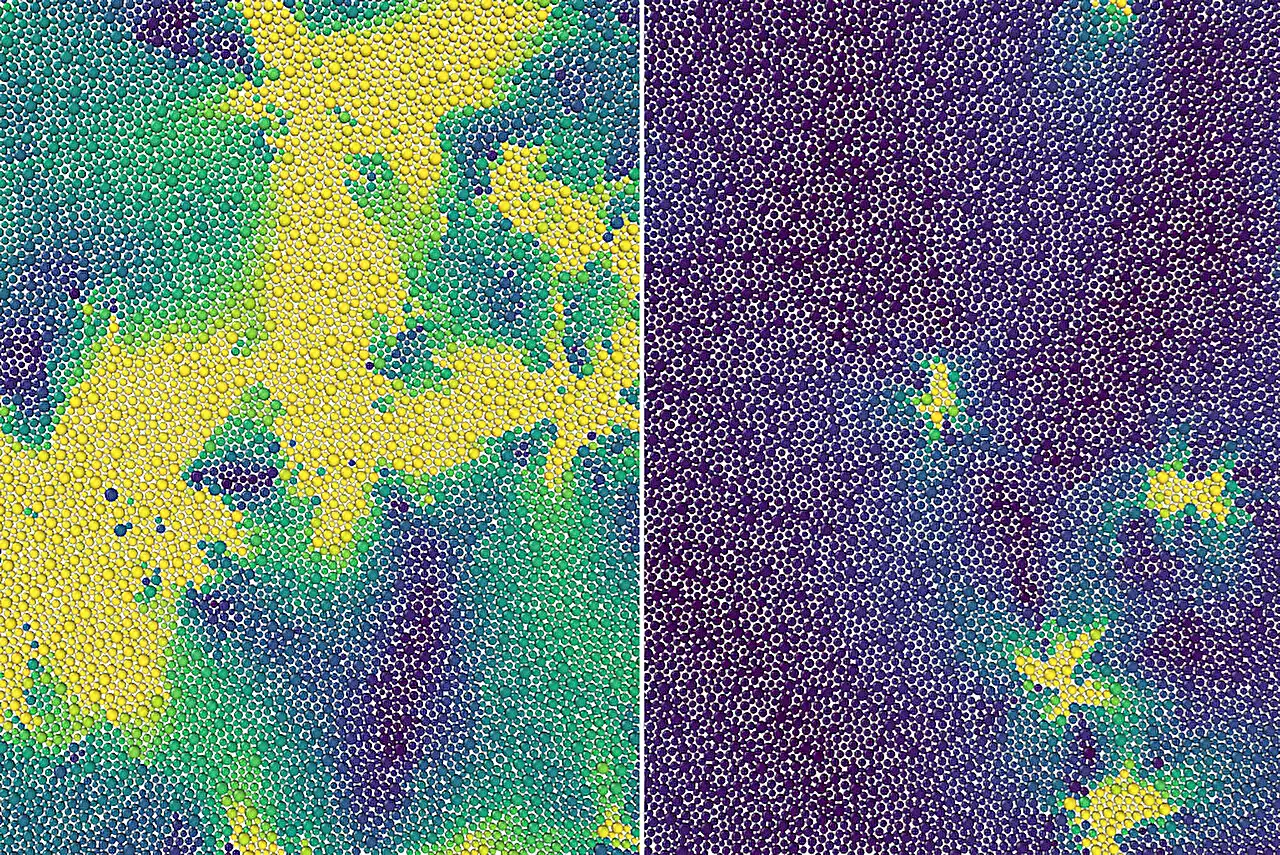Anything made out of plastic or glass is known as an amorphous material. Unlike many materials that freeze into crystalline solids, the atoms and molecules in amorphous materials never stack together to form crystals when cooled. In fact, although we commonly think of plastic and glass as 'solids,' they instead remain in a state that is more accurately described as a supercooled liquid that flows extremely slowly.
, and previous experiments, the scientists explained why the molecules in these materials, when cooled, remain disordered like a liquid until taking a sharp turn toward a solid-like state at a certain temperature called the onset temperature—effectively becoming so viscous that they barely move. This onset of rigidity—a previously unknown phase transition—is what separates supercooled from normal liquids.
"Our theory predicts the onset temperature measured in model systems and explains why the behavior of supercooled liquids around that temperature is reminiscent of solids even though their structure is the same as that of the liquid," said Kranthi Mandadapu, a staff scientist in Berkeley Lab's Chemical Sciences Division and professor of chemical engineering at the University of California, Berkeley, who led the work which was published inAny supercooled liquid continuously jumps...
As the supercooled liquid's temperature increased to the onset temperature, they propose that every instance of a bound pair of defects broke apart into an unbounded pair. At precisely this temperature, the unbinding of defects is what made the system lose its rigidity and begin to behave like a normal liquid.that 'melts' a supercooled liquid into a liquid. This should be relevant for all supercooled liquids or glassy systems," said Mandadapu.
The theory and simulations captured other key properties of glassy dynamics, including the observation that, over short periods of time, a few particles moved while the rest of the liquid remained frozen.temperatureMandadapu and his colleagues believe they will be able to extend their model to 3D systems. They also intend to expand it to explain just how localized motions lead to further nearby excitations resulting in the relaxation of the entire.
"It's fascinating from a basic science point of view to examine why these supercooled liquids exhibit remarkably different dynamics than the regularDimitrios Fraggedakis et al, Inherent-state melting and the onset of glassy dynamics in two-dimensional supercooled liquids,
Malaysia Latest News, Malaysia Headlines
Similar News:You can also read news stories similar to this one that we have collected from other news sources.
Europe's clinical trials startups struggling to scale, unlike the USInsider tells the global tech, finance, markets, media, healthcare, and strategy stories you want to know.
Read more »
Reddit - Dive into anything
Read more »
 34 Wildly Stupid Company 'Perks' That Prove Employers Will Literally Offer You Anything But A RaiseIncluding actual Monopoly money.
34 Wildly Stupid Company 'Perks' That Prove Employers Will Literally Offer You Anything But A RaiseIncluding actual Monopoly money.
Read more »
 Jets taking Dalvin Cook leap makes anything but Super Bowl win a failureThe Jets are all-in. Period. End of story.
Jets taking Dalvin Cook leap makes anything but Super Bowl win a failureThe Jets are all-in. Period. End of story.
Read more »
 Georgia indictment could be a 'problem' for Trump, Katie Pavlich argues: 'Never seen anything like this'Fox News contributor Katie Pavlich discusses what impact former President Donald Trump's fourth indictment could have on his 2024 campaign for the White House.
Georgia indictment could be a 'problem' for Trump, Katie Pavlich argues: 'Never seen anything like this'Fox News contributor Katie Pavlich discusses what impact former President Donald Trump's fourth indictment could have on his 2024 campaign for the White House.
Read more »
 Ask Us Anything ArchivesSee the latest Ask Us Anything stories from Popular Science. See news, trends, tips, reviews and more at Popular Science.
Ask Us Anything ArchivesSee the latest Ask Us Anything stories from Popular Science. See news, trends, tips, reviews and more at Popular Science.
Read more »
